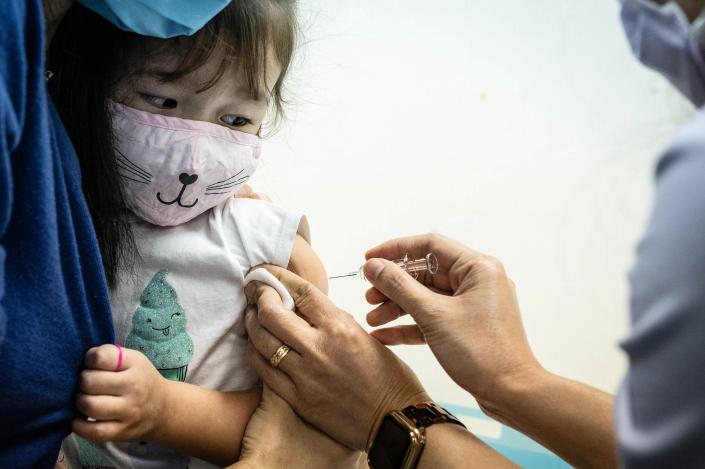China’s Covid Vaccine Drive Derails Routine Inoculations, Experts Say

High demand for coronavirus vaccines and a shortage of community health workers are disrupting routine inoculations in China, public health experts have said.
Vaccinations against other diseases have “abruptly stopped” since the start of the pandemic, said Xu Aiqiang, the deputy director of the disease control body in East China’s Shandong province, at a recent conference on immunization strategy.
The decline in routine vaccinations, which is part of a global trend, increases the risk of outbreaks of preventable diseases, said Liang Xiaofeng, secretary general of the Chinese Preventive Medicine Association, at the same conference.
China’s efforts to scale up its Covid-19 inoculation drive have so far struggled to overcome production capacity shortages. The world’s most populous nation had administered 80.5 million shots as of Monday, covering a lower proportion of its total population than many Western nations. Most of China’s Covid-19 vaccines require two jabs to achieve full immunity.
Attendees at the conference said China’s coronavirus immunization campaign has dramatically increased the workload of community-level vaccinators and left many unable to administer routine inoculations.
The country “needs to consider” whether the Chinese Center for Disease Control and Prevention, the national disease control body, can move quickly enough on issues including vaccine storage and delivery, said Feng Luzhao, executive vice president of a major public health institute affiliated with Peking Union Medical College.
Previous reporting by Caixin showed that many localities in China have had to open temporary vaccination points to separate people seeking Covid-19 inoculation and those seeking other jabs. However, responsibility for administering the shots typically fell to community health centers, many of which employ comparatively low numbers of staff and rely on volunteers.
“The number of vaccinators cannot meet the demand for universal Covid-19 immunization,” said Feng Danlong, a member of China’s main political advisory body, at the “Two Sessions” political meetings in Beijing earlier this month.
“We may end up focusing too much on one thing and losing sight of the other,” Feng added, referring to the relative importance of coronavirus vaccinations ahead of routine shots. “This may affect the prevention and control of Covid-19 and other infectious diseases.”
Since its establishment in 2004, China’s existing national inoculation program has required the country to have at least one vaccinator for every 10,000 people. By 2019, that proportion stood at 1.7 per 10,000 people, even though the number of required vaccinations had risen from five to 14 — a trend that was already pressuring vaccine delivery prior to the pandemic, Feng said.
Routine vaccinations must continue even if China experiences further Covid-19 outbreaks or a resources squeeze, Xu said, adding that localities should prioritize shots against common or dangerous diseases like diphtheria, pertussis and tetanus, followed by those related to national and global strategic goals, such as jabs against polio and measles.
Yang Huan, a former high-level researcher at the State Food and Drug Administration, said China should focus on administering combined vaccines to reduce vaccinators’ workloads.
China administered around 5.5 million doses of Covid-19 vaccine between Saturday and Monday, signifying a surge in inoculations after a slow start to its immunization campaign late last year.
Assuming the unlikely scenario that each vaccine recipient has been injected with a single dose, around 5.7% of the country’s total population has some level of immunity against Covid-19, a significantly lower proportion than the United States, the U.K. and other countries.
China has so far approved four coronavirus vaccines for public use, including two separately developed jabs by affiliates of state-owned China National Pharmaceutical Group Corp., one by Sinovac Biotech Ltd., and one by CanSino Biologics Inc. (688185.SH). All of the vaccines except CanSino’s require two doses.
Contact reporter Matthew Walsh (matthewwalsh@caixin.com) and editor Joshua Dummer (joshuadummer@caixin.com)
Download our app to receive breaking news alerts and read the news on the go.
Follow the Chinese markets in real time with Caixin Global’s new stock database.







